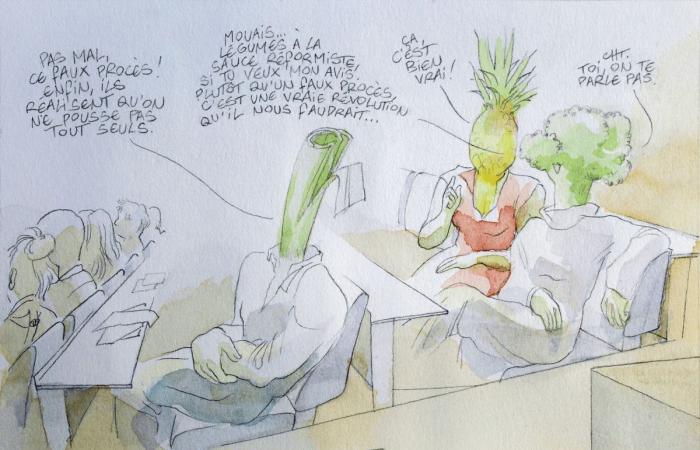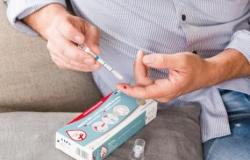Mock trial in Lausanne –
Swiss agriculture escapes criminal conviction
The Rumine Disputes Prosecutor’s Office wanted to force her to treat an addiction to phytosanitary products. But the accused knew how to touch the hearts of the jury.
Published today at 5:12 p.m.
Lisenn Béchir, illustration student at HEAD-Geneva. Instagram: @feutatruk
Subscribe now and enjoy the audio playback feature.
BotTalk
Bad times for the idols, debunked and dragged to justice, what does their great age and the respect shown to them matter. Saturday evening, it was agriculture, 10,000 years tightly packed, which had to face a popular jury at the Palais de Rumine. His main crime, according to prosecutor David Raedler’s indictment: having violated the criminal standard of the Environmental Protection Act through his “addictive, and often disproportionate, use of certain toxic products and substances with deleterious effects yet well known.
Defended by Me Claude Ramoni, the accused several thousand years old, showed a dashing face, in the guise of Steve Montandon, president of the Young Vaudois Farmers. His line of defense was clear: nothing to be ashamed of on Swiss territory, where the ecological transition has been underway for a long time.
Does she at least recognize past excesses? the Prosecutor asks him. The accused reframes: “At the end of the war, the people were hungry. There was the baby boom and the rural exodus, which meant that fewer and fewer people were there to help work the land. We had to find solutions. Mechanization and the provision of chemical inputs have made it possible to double our productivity and avoid famine in Switzerland.”
Nurturer above all
From the parade of witnesses for the prosecution and the defense, the assembly concluded that organic agriculture is part of the answer to the environmental problem, but that because of its yield, it could not on its own feed the people. “The role of Swiss agriculture is to offer affordable prices to the entire population, including low-income families,” the accused said.
This nourishing agriculture wonders why it is there, alone. The trial highlights the complexity of the case. The director of the Fédération romande des consommateurs, Sophie Michaud Gigon, is called to the stand. The president of the court, Marie-Pomme Moinat, takes action: “The Swiss consumer wants strawberries in winter and does not seem ready to pay the correct price for food without pesticides. What is its responsibility in the crimes accused of agriculture? Long silence.
Sophie Michaud Gigon avoids, then targets mass distribution, “which, in peak season, increases its margins on Swiss cherry tomatoes, sold for 10 francs. per kilo, because they benefit from customs protection. The consumer does not understand why this price is so high.”
Toxic relationship
Migros, Coop, Lidl, Aldi and so on: both main customers of agriculture and profiteers? Agroeconomist Guyliane Leuba makes the diagnosis: “Large distribution exploits the weaknesses of the system and it would be fair if it agreed to revise its margins downwards for the benefit of producers.” In short, “agriculture finds itself in a toxic romantic relationship with mass distribution,” summarizes the prosecutor.
A polyamorous relationship, because agriculture would also compromise with the right and the economic lobbies in Bern, in exchange for their support for direct payments, he asserts. Which leads, for example, the Swiss Farmers’ Union to recommend yes to the widening of highways, “even though this will sacrifice 50 hectares of agricultural land”.
David Raedler requires a day of deprivation of liberty, but above all forced treatment for his drug dependence. Unsurprisingly, Me Ramoni pleads acquittal: “Everyone pollutes! There is no alternative to agriculture and it is a virtuous actor in a rotten world.”
State of necessity
The verdict came shortly after: agriculture was acquitted. If the jury considers that she was at fault in the use of phytosanitary products, she acted “out of necessity”, “in order to feed the population”. The case is, however, joined to ongoing lawsuits against the consumer, mass distribution and the public administration. “To better determine the criminal responsibilities of each person.”
Perhaps the jury was touched by the final words of the accused before the deliberation. Speaking last, Steve Montandon wanted to step out of his one-night role to express, moved, his fed-up with a profession whose efforts are minimized: “No, we’re not addicted , we try to do without phytosanitary products. Nothing is all black or all white. Our job is to find a compromise between animal welfare, the climate, biodiversity and the best solution to guarantee food security.” And added: “If you condemn me, bring me a rope to my cell. Because behind my smile and my positivity lies an agriculture tired of being singled out.”
“Latest news”
Want to stay on top of the news? “24 Heures” offers you two appointments per day, directly in your email box. So you don’t miss anything that’s happening in your Canton, in Switzerland or around the world.
Other newsletters
Log in
Did you find an error? Please report it to us.
0 comments






